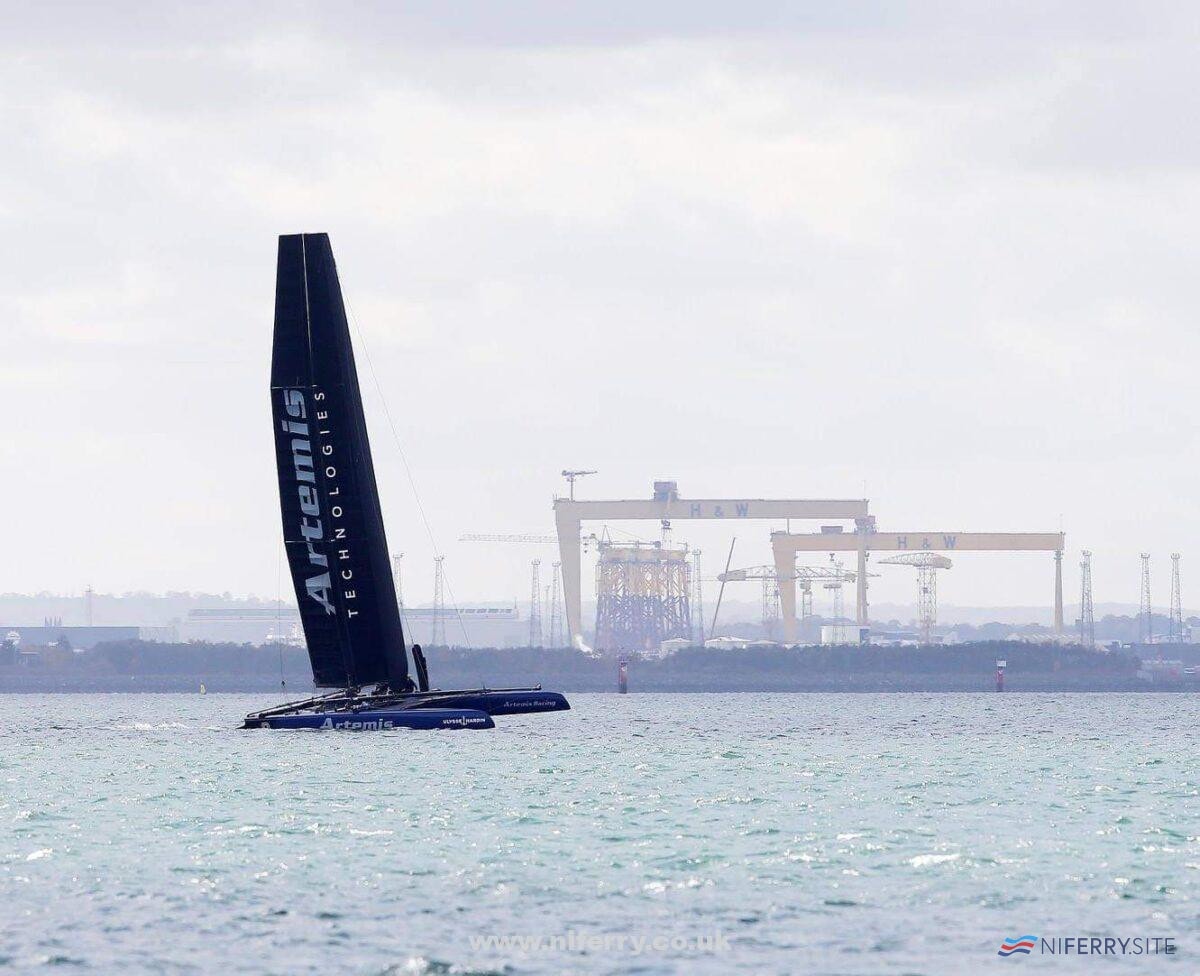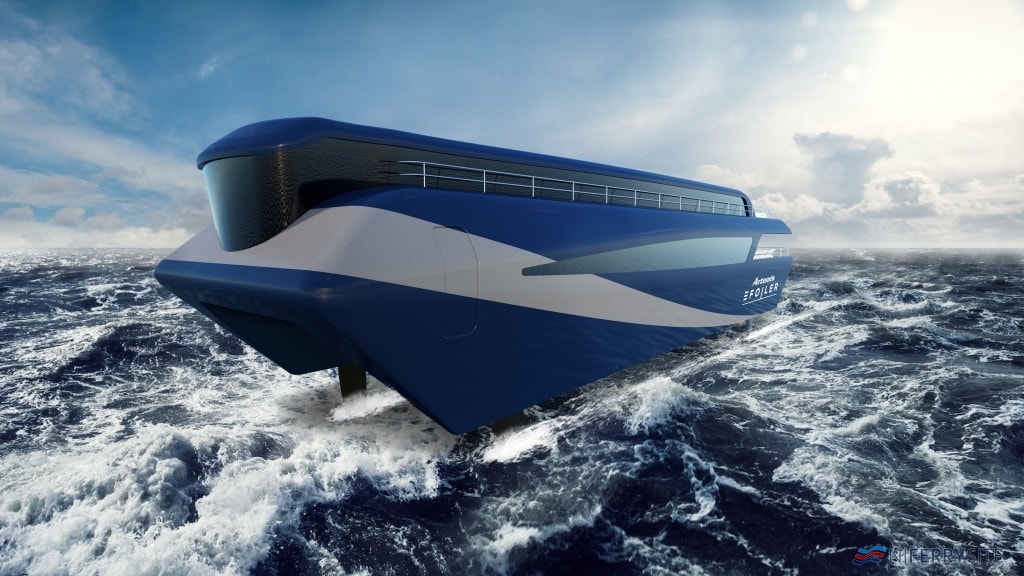Belfast Lough Pilot Project To Take Place From 2024
Channel Islands ferry operator Condor Ferries is to become a key player in a Belfast-based project to develop an ultra efficient zero emission passenger ferry.
Condor has joined the Belfast Maritime Consortium which is developing the project, and will operate the pilot route between Belfast and Bangor from 2024.
The vessel used will be the Artemis Technologies eFoiler®, a zero-emission hydrofoil currently being developed in Belfast.
The ultra efficient vessel is designed to fly above water, thus reducing water resistance and the wake produced at high speeds.
This lack of wake will be a key advantage in Belfast Lough where speed restriction is in place due to the wake caused by vessels impacting on the shoreline. This was a particular problem with previous high speed craft such as Stena Line’s HSS and the SeaCat vessels of Hoverspeed and Isle of Man Steam Packet.

John Napton, Condor Ferries’ CEO, said:
“We are always looking to the future, and this includes exploring ways of reducing our carbon emissions.
“As an experienced commercial ferry company, we are therefore happy to join the consortium and help to develop this concept into an operational mode of transport.”
Hydrofoil technology isn’t new and Condor has a history of operating such vessels on Channel Island services. A total of six different passenger-only hydrofoils sailed for the company between 1964 and 1993 before they were replaced totally by car carrying catamarans.
Artemis Technologies has ambitions to develop an autonomous version of its eFoiler®, and the pilot project will allow the consortium partners to gain valuable insight into the operation of these zero-emission craft.
The company has a manufacturing facility in the shadow of the famous cranes of Harland & Wolff Belfast shipyard and a simulator in nearby Lisburn. Artemis is also developing a number of other uses for its eFoiler® technology including workboats.
Silent and emission free
While using the same principle of gliding above the water on foils, the Artemis eFoiler® will use modern technology and materials to overcome the perceived weaknesses in precious hydrofoil designs.
The fully submerged electric drivetrain is not only more than twice as efficient as traditionally used Diesel engines, but also silent. The company, which has a background in boat racing, is also working to incorporate modern materials to build stronger but lighter vessels.

Dr Iain Percy OBE, CEO and Founder of Artemis Technologies said:
“The announcement that Condor Ferries is joining us in the Belfast Maritime Consortium is a hugely significant endorsement of the work we are doing and marks another milestone on our journey towards leading the decarbonisation of maritime.
“With vast experience operating commercial routes, Condor Ferries is well placed to run the inaugural service for the first commuter ferry to be produced at our manufacturing facility in Belfast.
“Working alongside our partners in Belfast City Council, Ards and North Down Borough Council, Belfast Harbour and Power NI, the pilot scheme will give us a better understanding of the needs of ferry operators and local authorities from a vessel design, usage, and infrastructure perspective.
“Belfast will get a glimpse of the future when the pilot service commences operation, but it is just the beginning. We are already receiving interest from around the globe as governments and cities across the world seek sustainable transport alternatives that balance the requirement for people to continue to move around with the need to reduce carbon emissions.”
A Greener Alternative Between Bangor and Belfast
The hydrofoil pilot route will increase options for passengers on the busy Bangor – Belfast commuter corridor. State-controlled Translink runs a direct train service which takes about 30 mins, a similar amount of time to the planned hydrofoil.
Unlike the train which runs on Diesel, however, the eFoiler® is designed to be zero emission. A much slower bus service is also available, also operated by Translink under its Ulsterbus banner.
Clare McGill, Head of Economic Development, Ards and North Down Borough Council, added:
“As a Council, we are strongly focused on finding new ways of acting more sustainably in how we live, work and operate.
“We welcome the addition of Condor Ferries to the Belfast Maritime Consortium as this allows for the possibility of sustainable transport and could offer our citizens the opportunity to enact a modal shift in transport between Belfast and Bangor, providing an alternative to sitting nose to tail in traffic every day.
A Step Closer to Net-Zero
John Walsh, Chief Executive of Belfast City Council said:
“The addition of Condor Ferries to the Belfast Maritime Consortium is hugely welcome and brings our city one step closer to realising our net zero ambitions.
“Blue-green infrastructure will be a vital part of Belfast’s integrated transport plan and we look forward to seeing zero emission ferries on Belfast Lough, transporting people between the City and North Down.”
While Artemis Technologies will lead the project and Condor Ferries will operate the vessels, there are 12 other partners in the scheme.
Condor Ferries was acquired in 2020 by the Columbia Threadneedle European Sustainable Infrastructure Fund asset management company. Breton ferry company Brittany Ferries took a minority stake in Condor as part of the same transaction.
The Belfast Maritime Consortium is a 14-member syndicate which includes both Northern Ireland’s universities and Belfast Metropolitan College. A number of engineering and technology companies are also involved such as Spirit AeroSystems which took over Bombardier’s aircraft manufacturing facilities in the province.
The full list of consortium members is: Artemis Technologies, Ards and North Down Borough Council, Belfast City Council, Belfast Harbour, Belfast Met, Catalyst, Condor Ferries, Creative Composites, Invest Northern Ireland, Northern Ireland Advanced Composites Engineering (NIACE), Power NI, Queen’s University Belfast, Spirit AeroSystems, and Ulster University.
